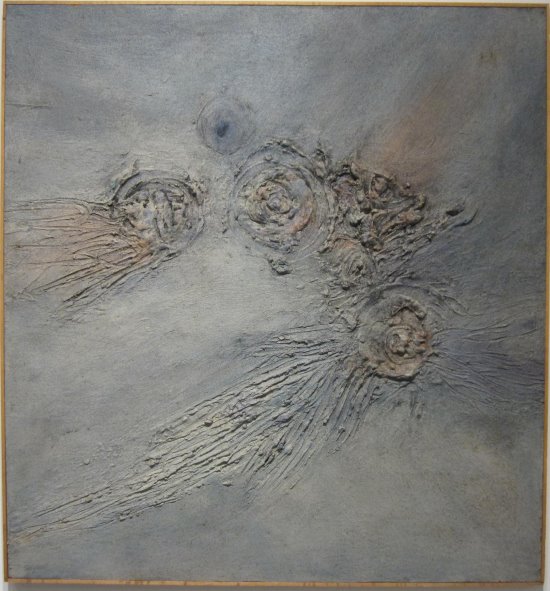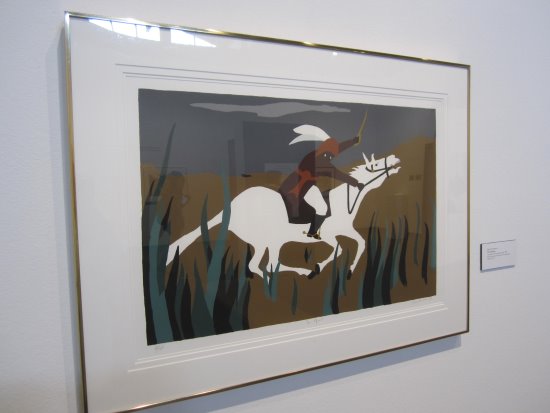
| ||||||
Upon entering the museum, guests will first experience the Jacob Lawrence (1917-2000) exhibit. Using an expressive and abstract style, the artist, according to the Washington State Arts Commission, "explores the human condition, the African American experience, American history, and themes of social justice."
Lawrence once described his own work by saying, "When the subject is strong, simplicity is the only way to treat it." His three series of prints include the topics: Toussaint L'Ouverture; Genesis; and Hiroshima.
Born in Atlantic City, New Jersey, Lawrence spent his early years in the New York City neighborhood of Harlem. Immersing himself in several art courses, thanks to scholarships, he became the first African American artist included in the New York Museum of Modern Art's permanent collection. Teaching art at several schools and universities until 1971, he went on to accept a full-time faculty position with the University of Washington in Seattle where he retired as a professor emeritus in 1983. Along the way, Lawrence received several awards including the Spingarn Medal (1970), the NAACP Annual Great Black Artists Award (1988), and the National Medal of Arts (1990).
Lawrence's Toussaint L'Ouverture series depicts the life of the Haitian revolutionary leader, born in 1743, as a slave. L'Ouverture eventually became commander-in-chief of the revolutionary army while leading efforts to create the country's first democratic constitution in 1800. Arrested by Napoleon Bonaparte's troops in 1802, he was imprisoned in Paris and died a year later. Unfortunately, he never saw a predominantly black Haiti become the second republic in the Western Hemisphere during 1804. "If these people, who were so much worse off than the people of today, could conquer slavery," stated Lawrence, "we can certainly do the same thing."
The exhibition's curator, Peter Nesbett, noted, "These prints are based on 41 paintings from a series which was completed in 1938. The paintings were executed in tempura and significantly smaller in scale than the prints. Lawrence reworked many of the images during the process of translating them to silk screen."
Lawrence's next eight prints, the Genesis series (1990), depict Bible verses from the King James version of Genesis. Growing up influenced under the Baptist faith, Lawrence's memories of Sunday school helped to drive this series. "I remember the ministers giving very passionate sermons pertaining to the Creation," he once said. "These things stay with you even though you don't realize what an impact these experiences are making on you at the time. As I was doing the series, I think that this was in the back of my mind, hearing this minister talk about these things."
The last of Lawrence's series at SMC is called Hiroshima. He was invited to provide illustrations for author John Hersey's 1946 work, "Hiroshima," and decided to focus on daily events occurring in the lives of a population at the moment the bomb dropped on Aug. 6, 1945. Although the graphic scenes were not country or city-specific they include a marketplace, farmers, a man with birds, a playground, a boy with a kite, a street scene, a park, and a family scene.
"Is it not ironic that we have produced great scientists, great musicians, great orators, chess players, philosophers, poets and great teachers and, at the same time, we have developed the capacity and the genius to create the means to devastate and to completely destroy our planet Earth, with all its life and beauty?" commented Lawrence. "How could we develop such creative minds and, at the same time, develop such a destructive instrument? Only God knows the answer. Let us hope that someday at some time, He will give us the answer to this very perplexing question."
The second exhibit, "From the Ground Up," features 22 works by Oakland artist Louis Siegriest (1899-1980), along with art by his colleagues from the Society of Six. The paintings range from his early "plein-air" works to his later efforts with asphalt and gypsum.
During the 1920s, the Society of Six (other Bay Area artists) practiced avant-garde approaches to painting with bold and bright colors captured outdoors in the daylight. The works depicted scenes in California.
"Often Siegriest is understood and heavily associated with his early role in the Society of Six, but it's important to remember he was only a teenager then," stated the exhibit's curator Britt Royer. "He continued to paint well into the 1980s, and unlike other group members, his paintings reflect a distinct divisional growth. This exhibition contextualizes Siegriest's exploration of landscape, honing into the meaning of place and how as an artist Siegriest refines his practice."
An interesting note to Siegriest's resume was that during World War II he worked as a camouflage artist. From an aerial perspective, he would assess buildings and determine the necessary patterns and colors needed to conceal them within their surrounding landscape. This helped him in his depiction of land with regards to his paintings. "I saw things with a different view than I had before," he stated. It gave him the ability to use an abstract pattern as the base to almost all of his future works. With this shift in his perspective, the 1950s saw Siegriest use thin layers of gypsum, asphalt, and even plain-old dirt in his more abstract creations.
SMC's Museum of Art (1928 Saint Mary's Road, Moraga) is open from 10 a.m. to 4 p.m. Wednesday through Sunday. Admission is free. For more information visit: www.stmarys-ca-edu/museum or call (925) 631-4379.

Reach the reporter at:
